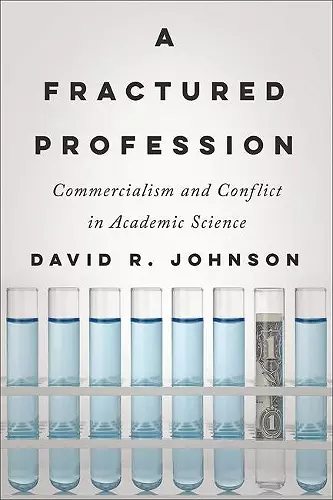A Fractured Profession
Commercialism and Conflict in Academic Science
Format:Hardback
Publisher:Johns Hopkins University Press
Published:10th Nov '17
Currently unavailable, and unfortunately no date known when it will be back

Contrasting the value patterns and work orientations of scientists who conduct research funded by business and industry with those of scientists who conduct research to advance knowledge, A Fractured Profession is an original contribution based on sound qualitative methodology. -- John M. Braxton, Vanderbilt University, coauthor of Professors Behaving Badly: Faculty Misconduct in Graduate Education
Focusing on how the profit motive is reshaping higher education and redefining what faculty are supposed to do, this book will appeal to scientists and academics, higher education scholars, university administrators and policy makers, and students considering a career in science.The commercialization of research is one of the most significant contemporary features of US higher education, yet we know surprisingly little about how scientists perceive and experience commercial rewards. A Fractured Profession is the first book to systematically examine the implications of commercialization for both universities and faculty members from the perspective of academic scientists. Drawing on richly detailed interviews with sixty-one scientists at four universities across the United States, sociologist David R. Johnson explores how an ideology of commercialism produces intraprofessional conflict in academia. The words of scientists themselves reveal competing constructions of status, conflicting norms, and divergent career paths and professional identities. Commercialist scientists embrace a professional ideology that emphasizes the creation of technologies that control societal uncertainties and advancing knowledge toward particular-and financial-ends. Traditionalist scientists, on the other hand, often find themselves embattled and threatened by university and federal emphasis on commercialization. They are less concerned about issues such as conflicts of interest and corruption than they are about unequal rewards, unequal conditions of work, and conflicts of commitment to university roles and basic science. Arguing that the division between commercialists and traditionalists represents a new form of inequality in the academic profession, this book offers an incisive look into the changing conditions of work in an era of academic capitalism. Focusing on how the profit motive is reshaping higher education and redefining what faculty are supposed to do, this book will appeal to scientists and academics, higher education scholars, university administrators and policy makers, and students considering a career in science.
Johnson thoughtfully considers the norms, tensions, and rules governing commercialization of research in academic settings, as well as the effects of commercialization on scientists' reputations and identity within the institution and profession. Academic scientists would be advised to take Johnson's interview protocol (included in the appendixes) to determine their own identity.
—Choice
Professor Johnson's very readable volume addresses debates about university-industry linkages from the under-explored perspective of the moral orders and identity work of academic scientists . . . While debates about the commercialization of university research tend to assume the traditionalist ethos is fragile in the face of commercial interests, this book provides an important antidote by showing the strengths of the traditionalist ethos even in the presence of commercialist peers . . . The book also provides several policy discussions about how to structure funding, university careers and resource allocations, graduate training, and university-industry relations. One hopes that this conversation will be taken up, especially as we are observing a cohort shift from those trained in the traditionalist mileau toward an increasingly commercialist-embedded cohort, making this a critical time for revisiting the roles of each of these camps in the university and the research system more generally.
—John P. Walsh, Georgia Institute of Technology, Social Forces
David R. Johnson advances the literature on academic capitalism by examining how scientists understand commercialization and how it shapes their scientific work and careers. His approach foregrounds culture and professional ideologies more than other research in this area, which tends to favor structuralist theories and emphasize macrolevel changes in the organization of science and higher education systems. A Fractured Profession is full of rich qualitative data that connect these large institutional changes to the practices and reasoning of scientists themselves . . . A Fractured Profession makes important contributions to research on academic capitalism. Professors, students, administrators, and policy makers would all benefit from reading it carefully.
—John McLevey, University of Waterloo, American Journal of Sociology
ISBN: 9781421423531
Dimensions: 229mm x 152mm x 18mm
Weight: 408g
192 pages